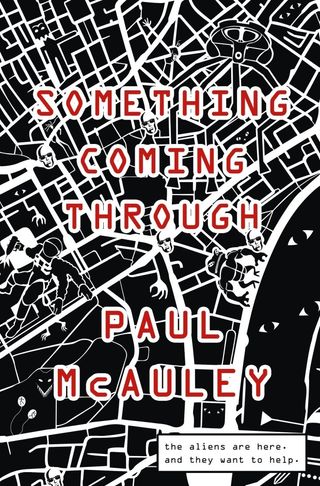With his latest novel Something Coming Through out now (why not read the SFX review?), author Paul McAuley ponders who or what might be out there in space in a blog entitled "Friends In High Places".

Some of the people active in the Search For Extra-Terrestrial Intelligence programme believe that while it’s essential to listen for signals from alien civilisations, it would be a terrible idea to advertise our presence with signals of our own. According to these dissidents, sending a message to ET would be like a kid shining a torch in random directions in a dark jungle full of strange beasts. There is a real risk that we might attract the wrong kind of attention – swarms of killer robots with a very bad attitude towards meat-based life, or aliens who want to exterminate or enslave us, farm us for our precious bodily fluids, or use us to practice their proctological skills. Even friendly-seeming ETs may possess ulterior motives, as in Damon Knight’s short story “To Serve Man”, where the eponymous alien manual turns out to be a cookbook.
But there may also be aliens out there who, like us, are genuinely curious about their fellow inhabitants of the galaxy. They’re looking for outgoing soulmates with a GSOH who want friendship and maybe more. They turn up on the crucial first date with gifts and trade items. They’re earnest, well-meaning and eager to help. Why shouldn’t we respond to their messages? What could possibly go wrong?
Fictional friendly alien species may be cat-like, or herbivorous cowards, or your basic lizard people, but they often possess similar levels of technology to us, and they also have, crucially, a version of Western capitalism. They’re keen to trade their stuff for our stuff, at competitive prices. We meet and mingle with them in space cantinas or space stations. There are always ships coming and going with cargoes of weird stuff that can be turned into profit. It’s the kind of interstellar free market that can be found in Larry Niven’s Known Space, Poul Anderson’s Polesotechnic League, or Kristine Kathryn Rusch’s Retrieval Artist series. And sometimes humans and aliens will collaborate in something rather more altruistic, as in the interstellar Médecins Sans Frontières of James White’s Sector General stories.
It’s a lovely idea that, once you get past the fur, feathers and tentacles, aliens are pretty much like us. There’s a utopian air of equality and fraternity, a cosiness, about all those interstellar equivalents of Rick's Café Américain. But even if aliens and human possess a technological parity, cultural and biological differences could create the kinds of problems explored by CJ Cherryh in her Chanur and Faded Sun series, or Stanislaw Lem in Fiasco. And while the universe is around thirteen billion years old, we’ve only had civilisation a few tens of thousand of years. If there are any intelligent aliens out there, it’s likely that their culture is going to be much older than ours. If we’re lucky, they’ll be benevolent, like the Hainish in Le Guin’s Hainish Cycle or the Overlords in Arthur C Clarke’s Childhood’s End. Or perhaps they’ll be mostly friendly but also mostly indifferent, like many of the aliens in Douglas Adams’ Hitchhiker series, or the Culture in Iain M Banks’s Culture universe.
In fact, friendly indifference may turn out to be much better than actual help. In A Brief History of Time, Stephen Hawking points out that human history is littered with examples of the damage caused by contact between human civilisations with different technological levels. Even fleeting contact with a civilisation a billion years old could cause irreparable harm. If it doesn’t destroy us, it would almost certainly, as in Childhood’s End or Robert Charles Wilson’s The Harvest, change us in unexpected ways. In James Tiptree Jr’s devastating story “And I Awoke And Found Me Here On The Cold Hillside”, aliens are so entrancing, so deeply imbued with fairy glamour, that they overload our sexual desires. The gift of interstellar travel from friendly aliens in James Patrick Kelly’s “Think Like A Dinosaur” creates difficult ethical problems. In Octavia Butler’s Xenogenesis series the survival of humanity from extinction after a devastating nuclear war depends on a sexual and genetic union with their alien rescuers. And in my novel Something Coming Through, the motives of the helpful Jackaroo are unclear and all of their previous clients have died out, but that doesn’t stop humanity, out of greed and pure monkey curiosity, playing with the stuff those clients have left behind . . .
Maybe the best we can hope for is that friendly, well-meaning aliens have recognised our vulnerability and turned the solar system into a reservation, deferring contact until we’re ready to meet our neighbours. The most famous example of this zoo hypothesis is probably Arthur C Clarke’s “The Sentinel”, the short story that was the basis for the film 2001: A Space Odyssey, in which the human race discover on the Moon a fire alarm that will summon the aliens. And it finds its ultimate expression in Keith Brooke's Harmony, in which friendly aliens have protected us by moving Earth into a pocket universe where no aliens exist. The ultimate act of alien kindness may be to exile us from the soulmates we have so long dreamed to find.
Sign up to the SFX Newsletter
Get sneak previews, exclusive competitions and details of special events each month!
Something Coming Through is out now, published by Gollancz in the UK.
For more top SF books coverage, subscribe to SFX
SFX Magazine is the world's number one sci-fi, fantasy, and horror magazine published by Future PLC. Established in 1995, SFX Magazine prides itself on writing for its fans, welcoming geeks, collectors, and aficionados into its readership for over 25 years. Covering films, TV shows, books, comics, games, merch, and more, SFX Magazine is published every month. If you love it, chances are we do too and you'll find it in SFX.
Most Popular



